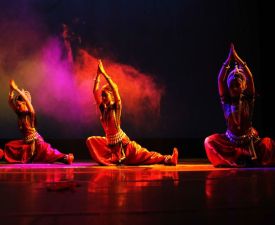Description
Course Name: Certificate in Dance & Cultural Management
Course Id: CDCM/Q0101.
Eligibility: 10+2 (Higher Secondary) or equivalent is required.
Objective: The Certificate in Dance & Cultural Management course is designed for individuals aspiring to manage dance schools, cultural organizations, festivals, and artistic initiatives. The course blends cultural understanding with management practices to ensure smooth execution of events, artist coordination, and institutional growth.
Duration: Three Months.






Debit/Credit Card, Wallet, Paytm, Net Banking, UPI, or Google Pay.



• A soft copy (scanned) of your certificate via email within 7 days of examination.
• A hard copy (original with official seal and signature) sent to your address within 45 day of declaration of result.

Online Examination Detail:
Duration- 60 minutes.
No. of Questions- 30. (Multiple Choice Questions).
Maximum Marks- 100, Passing Marks- 40%.
There is no negative marking in this module.
| Marking System: | ||||||
| S.No. | No. of Questions | Marks Each Question | Total Marks | |||
| 1 | 10 | 5 | 50 | |||
| 2 | 5 | 4 | 20 | |||
| 3 | 5 | 3 | 15 | |||
| 4 | 5 | 2 | 10 | |||
| 5 | 5 | 1 | 5 | |||
| 30 | 100 | |||||
| How Students will be Graded: | ||||||
| S.No. | Marks | Grade | ||||
| 1 | 91-100 | O (Outstanding) | ||||
| 2 | 81-90 | A+ (Excellent) | ||||
| 3 | 71-80 | A (Very Good) | ||||
| 4 | 61-70 | B (Good) | ||||
| 5 | 51-60 | C (Average) | ||||
| 6 | 40-50 | P (Pass) | ||||
| 7 | 0-40 | F (Fail) | ||||







Syllabus:
Module 1: Introduction to Dance and Cultural Management: Overview of performing arts and cultural management, Role of dance in society and heritage, Types of Indian and global dance forms, Importance of cultural institutions and events, Career paths in cultural management, Role of a cultural manager, Difference between artist management and event coordination, Understanding cultural policies and initiatives, Importance of preserving intangible heritage, Key organizations supporting arts and culture.
Module 2: Event Planning for Dance and Cultural Programs: Planning cultural and dance-based events, Identifying target audience and purpose, Preparing event proposals and concepts, Budgeting and resource allocation, Scheduling rehearsals and shows, Artist coordination and communication, Venue selection and stage requirements, Risk assessment and crowd management, Coordination with technical and backstage teams, Post-event feedback and reporting.
Module 3: Cultural Program Administration and Operations: Setting up a dance or cultural academy/NGO, Managing registrations and admissions, Designing class and performance schedules, Documentation and certification for students, Staff and instructor coordination, Maintaining rehearsal records and attendance, Managing costumes, props, and instruments, Conducting workshops and cultural seminars, Collaborating with cultural boards or sponsors, Handling local permissions and approvals.
Module 4: Marketing and Public Relations in Cultural Management: Creating a brand for cultural programs or institutions, Social media promotion of events and artists, Designing posters, invites, and brochures, Engaging media and press coverage, Building community and audience relationships, Sponsorship and partnership outreach, Use of digital tools and event platforms, Creating mailing lists and newsletters, Leveraging festivals and cultural days, Handling artist and audience feedback online.
Module 5: Financial and Legal Aspects: Managing funds and event budgets, Fee structuring for classes or shows, Fundraising and grant applications, Financial reporting and accountability, Contracts for artists and performers, Copyrights and performance rights, Licenses for music and performance, Insurance and safety protocols, Government schemes for cultural development, Audit and legal documentation.
Module 6: Cultural Sensitivity and Contemporary Trends: Understanding diversity in culture and expression, Promoting inclusivity through arts, Respecting traditional vs modern expressions, Working with regional and tribal communities, Fusion dance and interdisciplinary collaborations, Managing cross-cultural performances, Audience development and education, Use of technology in dance and cultural arts, International opportunities and exchanges, Trends in digital performance and cultural entrepreneurship.
✅ Career Opportunities After Certificate in Dance & Cultural Management
🔹 1. Dance Academy Manager / Cultural School Coordinator
-
Workplace: Dance schools, music institutions, cultural organizations
-
Role: Manage daily operations, coordinate classes, schedule performances, handle student registrations
-
Salary Range: ₹20,000 – ₹40,000/month (₹50,000+ in large institutions)
🔹 2. Cultural Event Coordinator / Festival Organizer
-
Workplace: State cultural departments, NGOs, private event firms
-
Role: Plan and manage cultural events, stage performances, heritage shows, and competitions
-
Salary Range: ₹18,000 – ₹45,000/month (freelancers earn ₹1,000–₹10,000/day/event)
🔹 3. Stage Production Assistant / Arts Program Manager
-
Workplace: Auditoriums, production houses, classical/folk art collectives
-
Role: Coordinate lighting, music, rehearsal, costume, and backstage operations
-
Salary Range: ₹15,000 – ₹35,000/month
🔹 4. Cultural Institution Administrator
-
Workplace: Museums, cultural centers, regional arts academies
-
Role: Handle staff, budget, public outreach, artist relations, and program planning
-
Salary Range: ₹25,000 – ₹50,000/month
🔹 5. Dance & Arts NGO Coordinator
-
Workplace: NGOs working on arts education, rural talent, heritage promotion
-
Role: Conduct community outreach, manage grants, host workshops and art festivals
-
Salary Range: ₹18,000 – ₹40,000/month (plus travel and project incentives)
🔹 6. Cultural Tourism Facilitator / Heritage Walk Organizer
-
Workplace: Tourism companies, state departments, art tours
-
Role: Design cultural itineraries, manage artist tie-ups, promote traditional art forms
-
Salary Range: ₹20,000 – ₹45,000/month (₹1,000–₹5,000/day for freelancers)
🔹 7. Entrepreneur – Start Own Dance/Culture Studio or Event Brand
-
Workplace: Independent or franchised studios, online platforms, event startups
-
Role: Offer dance training, host shows, collaborate with artists, monetize classes or YouTube/Instagram content
-
Earnings: ₹30,000 – ₹2,00,000+/month (depending on scale and branding)
🔹 8. Artist Manager / Cultural PR Executive
-
Workplace: Artist agencies, event companies, classical music festivals
-
Role: Manage performance schedules, brand deals, bookings, publicity, and artist travel
-
Salary Range: ₹20,000 – ₹60,000/month
🔹 9. Cultural Content Creator / Documentarian
-
Workplace: YouTube, social media, OTT platforms, cultural archives
-
Role: Create reels, documentaries, promotional videos on Indian art forms and dance events
-
Earnings: ₹20,000 – ₹1,00,000+/month (based on viewership and monetization)
🔹 10. Grant Writer / Cultural Project Proposal Assistant
-
Workplace: NGOs, art institutions, government schemes
-
Role: Draft proposals for funding, CSR grants, UNESCO heritage projects, and fellowships
-
Salary Range: ₹18,000 – ₹40,000/month (freelance: ₹1,000–₹10,000/project)
📈 Salary Overview by Role
| Job Role | Monthly Salary Range |
|---|---|
| Dance School Manager | ₹20,000 – ₹40,000+ |
| Cultural Event Coordinator | ₹18,000 – ₹45,000 |
| Stage Production Assistant | ₹15,000 – ₹35,000 |
| NGO Arts Program Coordinator | ₹18,000 – ₹40,000 |
| Artist Manager / PR Executive | ₹20,000 – ₹60,000 |
| Cultural Entrepreneur | ₹30,000 – ₹2,00,000+ |
🏢 Top Employers & Work Areas
-
Dance Institutions: Kalakshetra, Nrityagram, Ganesh Natyalaya, Shiamak Davar Institute
-
Cultural NGOs: Spic Macay, Raza Foundation, Sanskriti Foundation
-
Event Companies: Wizcraft, Seher India, Teamwork Arts
-
Government Departments: ICCR, Sangeet Natak Akademi, Ministry of Culture
-
Tourism & Heritage Organizations: INTACH, Incredible India, Smart Cities Cultural Projects






Reviews
There are no reviews yet.